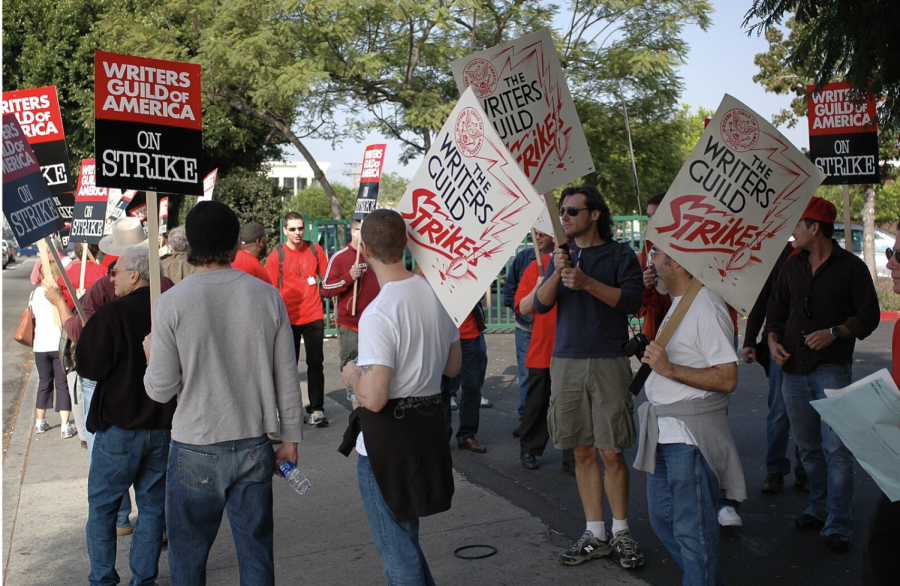TV writers and producers go on strike, demanding better pay. When will this end and why is it still going?
Protestors rally the streets, carrying signs in solidarity for their fellow writers and directors.
On Monday, May 1, the Writer’s Guild of America’s (WGA) and the Director’s Guild of America’s (DGA) three-year deal expired, forcing them to create a new contract to replace it. However, dissatisfaction with the new terms among workers has led to the stalling of a formal agreement.
Since then, writers and famed celebrities have been on strike, halting television production and causing protests in downtown Los Angeles and Manhattan, N. Y.
Yesterday, WGA finally reached a temporary consensus. Here’s an update on what’s still going on with this strike, what the WGA plans to do next, and how it could potentially change the film and music industry’s future.
Latest updates
In their temporary deal, WGA and DGA are working to increase pay for the television crew. Jon Avnet, the chairman of the Director’s Guild of America (DGA), told The New York Times on Sunday, June 4, that their new agreement “provides significant improvements for every director, assistant director, unit production manager, associate director, and stage manager in our guild.”
Although some terms have been met, protests are still occurring. Recently, protestors picked the LA shoot of Lionsgate producer and director Aziz Ansari’s “Good Trouble” for over two days on May 19. By May 24, there were “two dozen people at 2 a.m. out on the street,” according to The Hollywood Reporter.
Though the strike started in Los Angeles and Manhattan, this ongoing issue is seen in other production facilities in other parts of the country, such as Georgia. Last Wednesday, May 31, Peacock’s upcoming film, Hysteria, was targeted and blockaded in Atlanta.
Changes to the television and music industry
While the strikes early in the month have brought great media attention, this isn’t the first time television production has been held back due to writers’ labor disputes. In 2007, Hollywood faced a similar situation, with writers refusing to work as they were underpaid. During that time, notorious actors like Daniel Craig admitted to The New York Times that he had to “rewrite scenes himself while on set” for the latest “James Bond” franchise installment.
Today, production studios are halting their work because of the new setbacks. However, others are rushing into production with unfinished scripts because of the strikes. New films currently in the works have immensely slowed down in production or stopped entirely.
Among those, CNN reports that the final season of “Stranger Things” has been delayed. On Saturday, May 6, “Stranger Things” directors and writers, the Duffer Brothers, tweeted, “While we’re excited to start production with our amazing cast and crew, it is not possible during this strike. We hope a fair deal is reached soon so we can all get back to work.”
In solidarity with the WGA strike, musicians like Snoop Dogg and Dr. Dre have postponed their concerts in Hollywood. ABC 7 News explains that the artists originally planned their shows later in June but are now speaking “out against record labels and studios, claiming they don’t pay artists their fair share.”
What’s next?
As television production is growing rapidly, media companies, such as Netflix, are investing more and more money. Writers are protesting for better working conditions, which include higher residual pay. Many writers depend on this because it is “a crucial source of income for the middle-class writer who has been upended by streaming,” according to a report from The New York Times.
Despite some negotiation, screenwriters like Thunder Levin of the “Sharknado” franchise are hesitant. While he is content with the new terms as a director, “as a writer, (he) fears [the new negotiation] means the strikes will last a long time,” said Levin with CNN in an interview.




